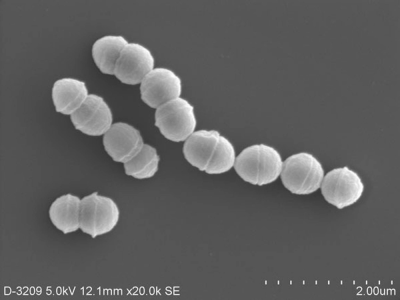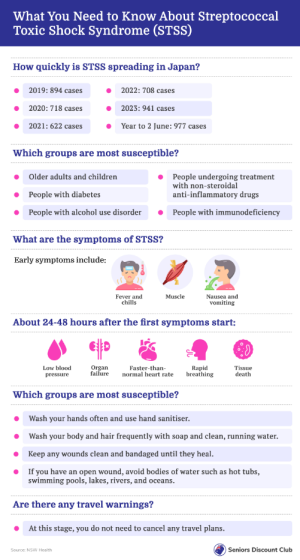Flesh-eating bacteria grips nation: What you need to know
By
- Replies 43
The term 'flesh-eating bacteria' is enough to send shivers down anyone's spine, and recent reports of an outbreak in Japan have certainly captured global attention.
Headlines have been dramatic, but it's important to separate fact from fear when understanding the risks and realities of this medical issue.
The outbreak in Japan is centred around a severe bacterial infection known as streptococcal toxic shock syndrome (STSS).
According to New South Wales Health, this condition is caused by group A streptococcus, a bacterium that can enter the bloodstream or deep tissue.
Group A streptococcus is often associated with mild infections like strep throat, particularly in children. Certain strains can become invasive, leading to a more serious condition.
STSS, a complication of iGAS, can quickly escalate into a life-threatening emergency.
Symptoms can develop quickly, including fever, chills, muscle aches, nausea, vomiting, low blood pressure, organ failure, and rapid breathing.
One of the most severe symptoms is the death of body tissue, also known as necrosis, which has led to the dramatic moniker 'flesh-eating bacteria'.
Japan's National Institute of Infectious Diseases has reported a noticeable increase in STSS cases.
As of 2 June, there were 977 reported cases, surpassing 941 cases for the previous year.
This spike has been the highest since Japan began its current recording method.
While the exact cause of the rise is unclear, health authorities suggested that the relaxation of COVID-19 measures and a subsequent increase in respiratory infections may be contributing factors.
It's important to note that this trend is not exclusive to Japan. Similar increases in STSS cases have been recorded in Europe, indicating a broader pattern that warrants attention.
According to Tokyo Women's Medical University professor Ken Kikuchi, speaking to Japan's national broadcaster NHK, people's immune systems weakened during the lockdown period.
‘We can boost immunity if we are constantly exposed to bacteria, but that mechanism was absent during the coronavirus pandemic,’ he explained.
‘So, more people are now susceptible to infection, and that may be one reason for the sharp rise in cases.’
The exact mode of transmission for STSS is not fully understood. While individuals with open wounds are at higher risk, nearly half of those diagnosed do not have a clear entry point for the bacteria.
Certain groups are more susceptible, including older adults, children, people with diabetes, those with alcohol use disorders, individuals taking non-steroidal anti-inflammatory drugs, and people with compromised immune systems.
STSS requires hospital care and is treated with antibiotics. In some cases, surgery may be necessary to remove the source of the infection.
There are currently no vaccines available for STSS, so prevention is key. Maintaining good hygiene is the best defence against infection.
This includes frequent handwashing, using hand sanitiser, keeping wounds clean and covered, and avoiding bodies of water if you have an open wound.
For those who plan to travel to Japan or other affected areas, there is no need to cancel their trip.
Smartraveller and the World Health Organisation have not issued travel restrictions related to STSS.
While the infection is serious, it is still considered rare for STSS to spread from person to person. However, it is wise to stay informed and practice good hygiene while travelling.
Similarly, health authorities in Australia have issued warnings regarding the increasing cases of a deadly tropical disease.
The disease has led to two fatalities and 22 infections, with a recent surge in cases coinciding with the onset of the wet season. For more information, you can read about this news here.

Have you or someone you know been affected by a similar infection? What precautions do you take to stay healthy while travelling? Share your insights in the comments below.
Headlines have been dramatic, but it's important to separate fact from fear when understanding the risks and realities of this medical issue.
The outbreak in Japan is centred around a severe bacterial infection known as streptococcal toxic shock syndrome (STSS).
According to New South Wales Health, this condition is caused by group A streptococcus, a bacterium that can enter the bloodstream or deep tissue.
Group A streptococcus is often associated with mild infections like strep throat, particularly in children. Certain strains can become invasive, leading to a more serious condition.
STSS, a complication of iGAS, can quickly escalate into a life-threatening emergency.
Symptoms can develop quickly, including fever, chills, muscle aches, nausea, vomiting, low blood pressure, organ failure, and rapid breathing.
One of the most severe symptoms is the death of body tissue, also known as necrosis, which has led to the dramatic moniker 'flesh-eating bacteria'.
Japan's National Institute of Infectious Diseases has reported a noticeable increase in STSS cases.
As of 2 June, there were 977 reported cases, surpassing 941 cases for the previous year.
This spike has been the highest since Japan began its current recording method.
While the exact cause of the rise is unclear, health authorities suggested that the relaxation of COVID-19 measures and a subsequent increase in respiratory infections may be contributing factors.
It's important to note that this trend is not exclusive to Japan. Similar increases in STSS cases have been recorded in Europe, indicating a broader pattern that warrants attention.
According to Tokyo Women's Medical University professor Ken Kikuchi, speaking to Japan's national broadcaster NHK, people's immune systems weakened during the lockdown period.
‘We can boost immunity if we are constantly exposed to bacteria, but that mechanism was absent during the coronavirus pandemic,’ he explained.
‘So, more people are now susceptible to infection, and that may be one reason for the sharp rise in cases.’
The exact mode of transmission for STSS is not fully understood. While individuals with open wounds are at higher risk, nearly half of those diagnosed do not have a clear entry point for the bacteria.
Certain groups are more susceptible, including older adults, children, people with diabetes, those with alcohol use disorders, individuals taking non-steroidal anti-inflammatory drugs, and people with compromised immune systems.
STSS requires hospital care and is treated with antibiotics. In some cases, surgery may be necessary to remove the source of the infection.
There are currently no vaccines available for STSS, so prevention is key. Maintaining good hygiene is the best defence against infection.
This includes frequent handwashing, using hand sanitiser, keeping wounds clean and covered, and avoiding bodies of water if you have an open wound.
For those who plan to travel to Japan or other affected areas, there is no need to cancel their trip.
Smartraveller and the World Health Organisation have not issued travel restrictions related to STSS.
While the infection is serious, it is still considered rare for STSS to spread from person to person. However, it is wise to stay informed and practice good hygiene while travelling.
Similarly, health authorities in Australia have issued warnings regarding the increasing cases of a deadly tropical disease.
The disease has led to two fatalities and 22 infections, with a recent surge in cases coinciding with the onset of the wet season. For more information, you can read about this news here.
Key Takeaways
- Japan has experienced an increase in cases of streptococcal toxic shock syndrome (STSS), a potentially deadly infection caused by group A bacteria.
- As of 2 June, Japan reported 977 cases of STSS, surpassing the total number of cases recorded for the entire previous year.
- While the exact reasons for the rise in cases are unclear, it was suggested that a reduction in exposure to bacteria during COVID-19 lockdowns may have weakened immune systems.
- Good hygiene practices are recommended to avoid infection, as no vaccine is available for STSS.
Last edited by a moderator:









